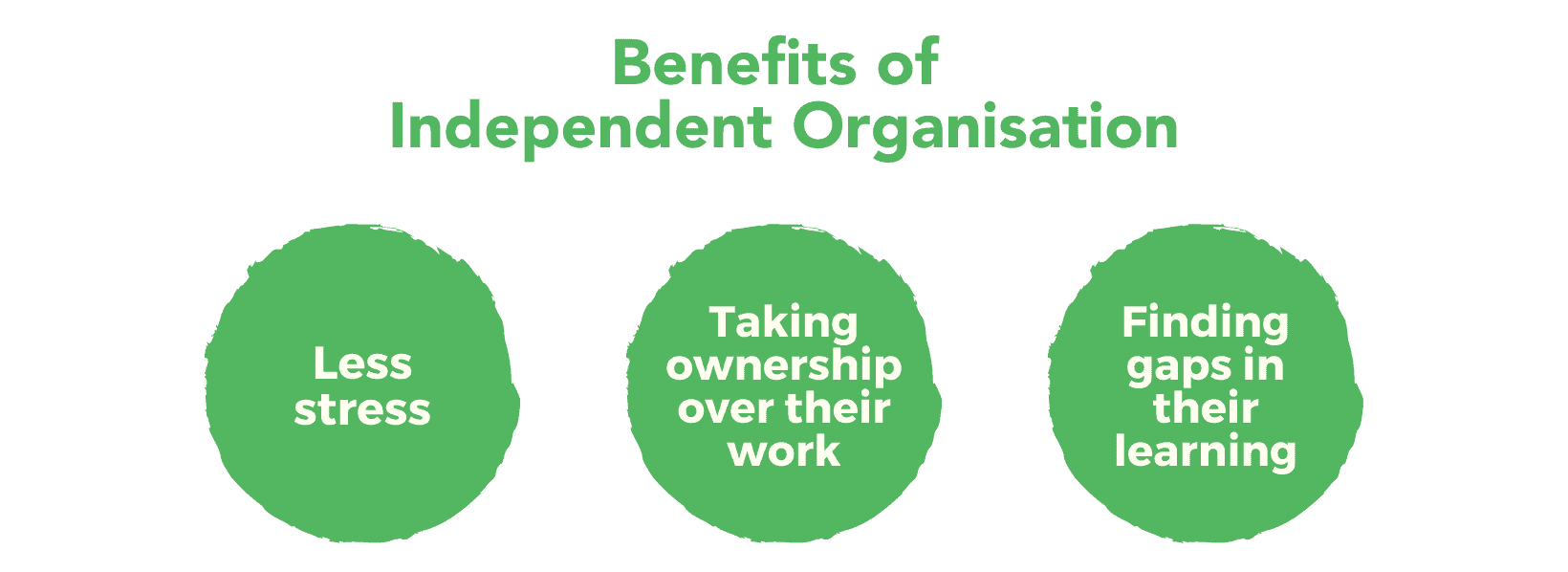As the year ticks on and HSC slowly looms, you may be wondering the best ways to get your child ready for their final exams. Routines, study patterns, tutors, revision… Is there a study skills handbook to guide you through it all?!
Lucky for you, there is — you’re reading it right now. We will go through a bunch of tips and offer you some great resources to continue helping your child to stay organised and get HSC ready!
We’ve got plenty to pack into this one, so let’s get started.
The Importance of Independent Organisation for the HSC
Part 1: Teaching Responsibility for Study and Success
Part 2: Teaching Your Child Self-Discipline When Studying
Part 3: Helping Your Child Make a Study Plan
The Importance of Independent Organisation for the HSC
Before we get into specific issues and tips from our study skills handbook, let’s look at why being organised is so important for HSC students. There are three main reasons.
First, organisation generally means less stress. When there is a clear structure for the day and months ahead, students have the ability to plan out their workload and stay on top of tasks. They can break things down into bite-size activities and regularly reflect on their learning.
Being organised also allows students to take ownership over their work. HSC students are more likely to succeed if they believe that what they’re taking on is important for their learning, so this is a big one.
Finally, being organised shows students where gaps are in their learning. If your child is regularly reviewing all content and has a plan for tackling tricky concepts, they are going to be in a great position to get help from teachers or peers. This puts them at a huge advantage over people who try to learn the content, say, the week before an exam.
Students taking responsibility for this organisation means that success rests on their shoulders. While this can be daunting, it usually encourages students to work hard and aim for better marks. They will also get to marvel at their victory come results day!
Starting early is KEY to building healthy HSC habits. Set them up for success with personalised tutoring support! Keen to get started? Check out the K-12 tutoring help we can provide in Bondi Junction, and all across Sydney!
Now let’s get into our specific tips!
Part 1: Teaching Responsibility for Study and Success
In the first part of our study skills handbook, we’ll be exploring how you can give your child more responsibility for their study and success.
As we just touched on, being organised and working hard early can help students to own their study habits. They feel responsible to themselves for success, rather than to parents, teachers, or another external force.
What is success?
Before we understand this point, we need to know what success is. In short, HSC success means seeing your child do their best, overcome academic fears, get the marks they aim for and not give up.
Importantly, you may notice that this is far more about having a certain mindset than hitting killer marks. Success will look different for every HSC student.
At a minimum, you want your child to feel on top of their game and ready to take on new challenges that have the potential to push their marks up.
Building Trust
No one wants to be the pushy helicopter parents, especially not to older teenagers. Helping your child to feel successful and work independently can be a fine line.
It’s great to treat the HSC year like a transition period, where you guide your child and give them tips, but also take a step back while they make their own decisions. This can be true in all parts of life, but is especially important for study!
The main way to help your child feel like they are responsible for their HSC is by building trust and independence.
If your child feels like you trust them and have confidence in their decision-making skills, they are more likely to enact self-discipline and feel accountable for their own success.
It’s good to communicate with your child about the added independence you are giving them. Generally, you will still offer advice and help make big decisions, but HSC can be a time to let your child try their own study routines, even if you don’t totally agree with them.
This technique does two main things:
Want to learn more about making your child responsible for their own success? Find out more here!
Part 2: Teaching Your Child Self-Discipline When Studying
We’ve talked about why ownership of success is important. However, how will students reach a point of success if they don’t have study schedules and a way of working towards their goals?
In this section of the study skills handbook, we will continue working through different principles that you can help your child to adopt. Let’s start with the art of self-discipline and study routines.
What is self-discipline?
There are many different definitions for self-discipline and therefore varied ways we could tackle this topic. However, self-discipline during the HSC can be understood as the skill of sustaining motivation and engagement for academia.
Students who are disciplined tend to listen in a classroom, retain important information and take it away to work on. They develop key study habits and care about their own success.
Importantly, students with good self-discipline are able to keep going, even when motivation wears thin or work gets rather hard. This is especially important for subjects your child doesn’t enjoy.
How to Help Your Child Develop Self-Discipline
This is a rather big topic and one that is going to vary for each child. However, there are a few key tips that can help develop this discipline.
It’s vital for other life skills like resilience, determination and accountability. Therefore, it’s a really crucial thing to learn.
Most students won’t be particularly disciplined if you just leave them on a whim to learn themselves.
Much like responsibility for success, you need to slowly relinquish your level of input into your child’s life. It’s a balancing game in which students and parents work together to find the best outcome.
Some ways you can cultivate discipline in your child are:
#1: Communicate goals with your child
By having clear goals that both you and your child agree with (but that are set up by them), your child will have clear accountability and continue working hard for the marks these desire. Though shared goals start with some outward motivation, letting your child set them and make their own decisions can be very beneficial.
#2: Co-create realistic expectations
Having goals that you and your child agree on are great, but there needs to be a way of getting there.
So you’ll need to be developing study expectations that take into account family life, extra curricular activities, their skills in certain subjects and downtime. Communicating these expectations to each other but letting your child take the reins will allow them to be in control of their own HSC.
#3: Create a study routine
As we will get into in the next section, a study routine can be really vital for discipline. Students need a structure that allows them to revise effectively, fit in additional activities and get some rest.
Good structures also encourage your child to continue working hard, even if they don’t feel like doing so.
Discover more practical tips for instilling self-discipline in your child here!
Part 3: Helping Your Child Make a Study Plan
So, you know how to cultivate self discipline in your child and get motivated. You’ve gotten handy tips for getting students to take responsibility for their success.
In a day to day capacity, however, you may still be wondering how to kick good study habits into action!
That’s where our final section of our study skills handbook comes in. We are going to break down what is needed in a killer study schedule and how you can help your child make one for themselves.
What makes a good structure?
Structures are important for discipline and momentum. As we talked about earlier, they also allow students to get on top of work early, ask questions, and keep motivated even if they don’t feel like it. All in all, pretty important stuff!
One of the key parts of a successful timetable is letting your child determine when they will study and why. This feeds into our previous points about having ownership over the HSC.
Some other important parts of a study timetable can be remembered through SPORT. Just like athletes training for a race, students are training for their HSC.
Here’s how to do it:
Specific times during the week need to be non-negotiable study periods (e.g. Wednesday 5pm, Thursday 6pm)
Pre-determine breaks for set times so that your child knows where they are up to, can push themselves and then revitalise
Outcomes should be a focus of study (e.g. learning a specific maths formula)
Remove all distractions! Phones are the biggest issue to get rid of.
Time-bound study works best. Create a clear end so your child knows when they will finish up and can work hard until that point.
How should we break up specific study times?
We are going to focus on the S in SPORT: specific study times throughout the week. It’s great if your child can create these and stick to them, but even better if they use them effectively. Let’s go through a few ways that study time can be used advantageously.
#1: Develop intimate knowledge of the syllabus
When your child creates their schedule, encourage them to schedule in times to go over each dot point of each subject. It’s not enough to just do a broad overview. Those top marks are in the detail!
Make sure your study notes are effective by following our step by step guide here.
#2: Learn material before class
Encourage your child to work time into their study schedule where they can go over content before they get to class! This will give them time to ask the teacher innovative questions.
Learning content early is also a great way to get into a consistent study schedule before the HSC actually begins. The more work they do early, the less they’ll need to do down the track.
#3: Teach others
Encourage your child to collaborate with or tutor their peers! No only will this share knowledge, but it’s great for memory retention and allows feedback.
#4: Schedule weekly time for HSC practice questions
At the end of the day, it doesn’t matter how much knowledge your child has if they can’t synthesise it into information that fits HSC questions. Scheduling time to practice answers early will get them familiar with structure and good at using key phrases.
And that’s our study skills handbook!
With that, you’ve got a brilliant overview of how to get your child on track for the HSC. Hopefully, you will be able to work with them to curate that study plan that instills responsibility and results.
If you’re on the hunt for additional resources, check out some of our articles below:
- The Ultimate Guide to Helping Your Child Stay Motivated for the HSC
- Why Study Breaks are Critical to Helping Your Child Maintain Their Wellbeing During the HSC
- Negative Self Talk: 3 Ways to Respond to Your Child’s Inner Critic
- How to Help Your Child Reduce Digital Distractions to Stop Procrastinating and Start Studying!
- How to Make the Most of Parent-Teacher Interviews
You can also head here to find all of our resources for academic study, wellbeing, and more!
Are you looking for some extra help for your child during the HSC?
We have an incredible team of HSC tutors and mentors!
We can help your child master their HSC subjects and ace their upcoming HSC assessments with personalised lessons conducted one-on-one in your home or at one of our state of the art campuses in Hornsby or the Hills!
We’ve supported over 8,000 students over the last 11 years, and on average our students score mark improvements of over 20%!
To find out more and get started with an inspirational HSC tutor and mentor, get in touch today or give us a ring on 1300 267 888!
Lucinda Garbutt-Young hopes to one day be writing for a big-shot newspaper… or maybe just for a friendly magazine in the arts sector. Right now, she is enjoying studying a Bachelor of Public Communication (Public Relations and Journalism) at UTS while she writes on the side. She also loves making coffees for people in her job as a barista, and loves nothing more than a sun shower.









